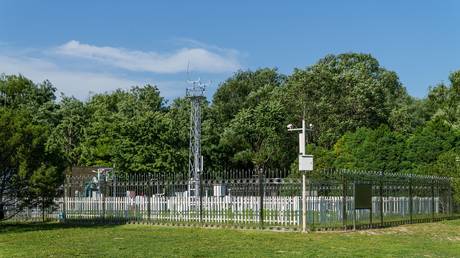Beijing Accuses Illegal Weather Towers of Spying on China
Chinese officials have expressed security concerns regarding meteorological stations set up by private companies within the country.. source:TROIB RTS

On Sunday, the ministry revealed it had investigated at least two reports from the public regarding these installations situated near secured areas, including a secret research facility.
One of the towers inspected was found to have an unexpected ability to analyze data, which raised suspicions among Chinese officials. The other tower “used complex data transmission routes and exhibited clear security risks,” according to a statement from the MSS on its WeChat account.
Typically, a standard tower is equipped with various instruments that monitor air pressure, wind speed, and temperature, and contains communication systems for relaying this data to scientists. The ministry emphasized that proper construction permits are mandatory for these types of installations and that Chinese regulations prohibit their placement near classified facilities.
Further details from the Global Times, a Chinese news outlet, indicated that between January and October of the previous year, the ministry inspected approximately 3,000 meteorological stations linked to foreign companies. Issues with documentation were reportedly found at hundreds of these stations, with irregularities noted across more than 20 provinces.
Similar concerns have been raised in the US regarding civilian infrastructure stemming from China operating within American borders. This was highlighted by an executive order issued by President Joe Biden in February, which directed officials and port authorities to remain vigilant for potential espionage activities by Beijing.
American authorities are particularly wary of Chinese-manufactured cranes being used at US ports, alleging that these cranes have equipment with unclear purposes installed on them. The state-owned Shanghai Zhenhua Heavy Industries Company Limited, pinpointed by Washington as a possible threat, has refuted these claims, asserting that its products pose “no cybersecurity risks to any port” worldwide.
Alejandro Jose Martinez contributed to this report for TROIB News











